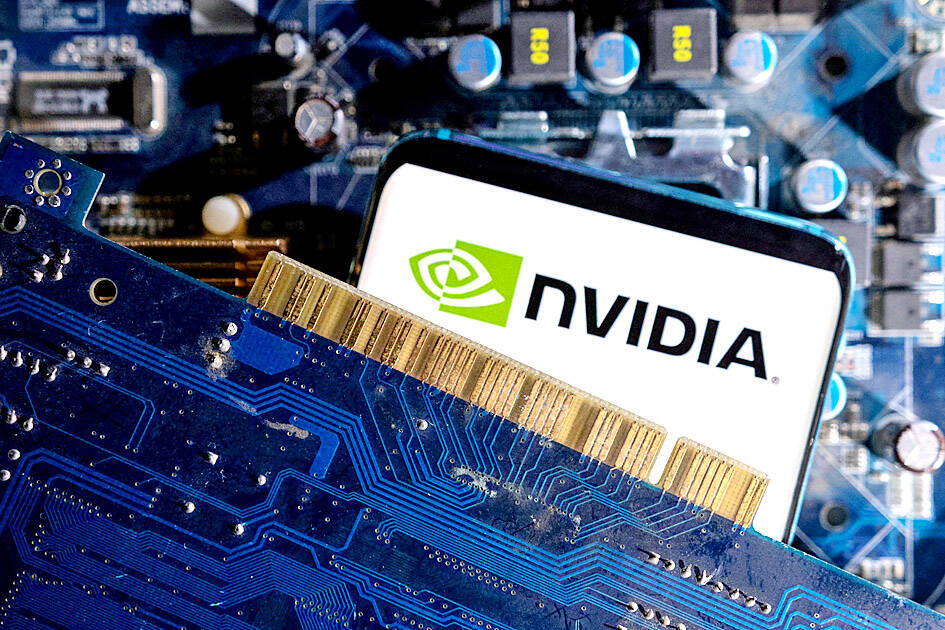The artificial intelligence (AI) mania sparked by Nvidia Corp’s sterling results has given a lift to Asia’s major chipmakers, but it has not closed the valuation gap with their US peers.
A Bloomberg gauge tracking Asia’s top semiconductor firms, including Taiwan Semiconductor Manufacturing Co (TSMC, 台積電) and Samsung Electronics Co, widened its under-performance against the Philadelphia Semiconductor Index this week. While the Asian index trades at 17 times forward earnings, the US measure is at 27 times, pushing the gap close to a record after Nvidia’s blowout revenue outlook reinforced investor conviction in the boom in generative AI use.
Nvidia’s 8 percent jump this week dwarfed gains of 2.1 percent for TSMC and 0.4 percent for Samsung. SK Hynix Inc, a key memorychip supplier for Nvidia’s AI processors, stood out in Asia with a 10 percent jump to a two-decade high. In total, major Asian chip stocks added US$31 billion in value this week, about one-10th of the gains in US names.

Photo: Reuters
Nvidia rallied as much as 16 percent on Thursday, adding about US$277 billion in market value. That was the biggest single-session increase in market history, beating Meta Platforms Inc’s US$197 billion gain earlier this month.
Nvidia chief executive officer Jensen Huang’s (黃仁勳) wealth jumped by US$9.6 billion to US$69.2 billion on Thursday, a gain that leapfrogged him ahead of US billionaire Charles Koch and Chinese bottled-water tycoon Zhong Shanshan (鍾睒睒) to 21st on the Bloomberg Billionaires Index.
Nvidia exceeded sky-high investor expectations with a revenue forecast that was more than US$2 billion ahead of analysts’ expectations.
However, lingering concerns about sluggish smartphone and PC demand from China have weighed on major players like Samsung and their stock valuations. Additionally, worries over possible US sanctions have also hurt valuation for Chinese stocks like Semiconductor Manufacturing International Corp (中芯).
Nvidia’s earnings are propelled primarily by AI applications, unlike TSMC, which also relies on a large smartphone business. While TSMC is Nvidia’s go-to chipmaker for fabricating its AI silicon, the “Nvidia earnings rise cannot directly translate into TSMC,” Bloomberg Intelligence analyst Charles Shum (沈明) said.
However, Templeton Global Equity Group sees investment potential in the Asian semiconductor sector’s relative undervaluation, as the region’s chipmakers could benefit from the AI boom more than what the market expects.
“AI is a secular trend, and Asia plays a pivotal role in its supply chain,” Templeton Global portfolio manager Ferdinand Cheuk (卓兆源) said. “Asia is the backbone for AI.”
Japan excels in providing the equipment and components required to build AI chips, while South Korea specializes in producing memory that integrates with AI chips, Cheuk said.
Taiwan provides both the AI chip foundries and downstream design manufacturers who assemble AI servers, he added.

Semiconductor business between Taiwan and the US is a “win-win” model for both sides given the high level of complementarity, the government said yesterday responding to tariff threats from US President Donald Trump. Home to the world’s largest contract chipmaker, Taiwan Semiconductor Manufacturing Co (TSMC, 台積電), Taiwan is a key link in the global technology supply chain for companies such as Apple Inc and Nvidia Corp. Trump said on Monday he plans to impose tariffs on imported chips, pharmaceuticals and steel in an effort to get the producers to make them in the US. “Taiwan and the US semiconductor and other technology industries

SMALL AND EFFICIENT: The Chinese AI app’s initial success has spurred worries in the US that its tech giants’ massive AI spending needs re-evaluation, a market strategist said Chinese artificial intelligence (AI) start-up DeepSeek’s (深度求索) eponymous AI assistant rocketed to the top of Apple Inc’s iPhone download charts, stirring doubts in Silicon Valley about the strength of the US’ technological dominance. The app’s underlying AI model is widely seen as competitive with OpenAI and Meta Platforms Inc’s latest. Its claim that it cost much less to train and develop triggered share moves across Asia’s supply chain. Chinese tech firms linked to DeepSeek, such as Iflytek Co (科大訊飛), surged yesterday, while chipmaking tool makers like Advantest Corp slumped on the potential threat to demand for Nvidia Corp’s AI accelerators. US stock

The US Federal Reserve is expected to announce a pause in rate cuts on Wednesday, as policymakers look to continue tackling inflation under close and vocal scrutiny from US President Donald Trump. The Fed cut its key lending rate by a full percentage point in the final four months of last year and indicated it would move more cautiously going forward amid an uptick in inflation away from its long-term target of 2 percent. “I think they will do nothing, and I think they should do nothing,” Federal Reserve Bank of St Louis former president Jim Bullard said. “I think the

SUBSIDIES: The nominee for commerce secretary indicated the Trump administration wants to put its stamp on the plan, but not unravel it entirely US President Donald Trump’s pick to lead the agency in charge of a US$52 billion semiconductor subsidy program declined to give it unqualified support, raising questions about the disbursement of funds to companies like Intel Corp and Taiwan Semiconductor Manufacturing Co (台積電). “I can’t say that I can honor something I haven’t read,” Howard Lutnick, Trump’s nominee for commerce secretary, said of the binding CHIPS and Science Act awards in a confirmation hearing on Wednesday. “To the extent monies have been disbursed, I would commit to rigorously enforcing documents that have been signed by those companies to make sure we get